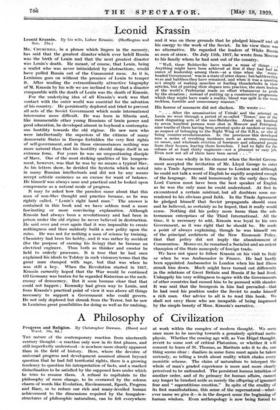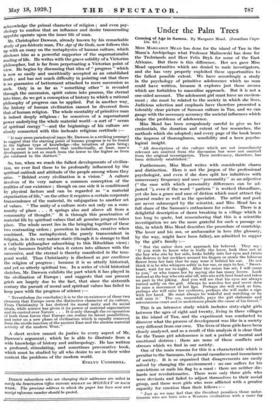A Philosophy of Civilization
Progress and Religion. By Christopher Dawson. (Shoed and Ward. 10s. ed.) THE nature of the contemporary reaction from nineteenth century thought—a reaction only now in its first phases, and still imperfectly understood—is nowhere more clearly apparent than in the field of history. Here, where the devotee of universal progress and development assumed almost beyond question that he had full territorial rights, there is a growing tendency to question his interpretation of facts, and a marked disinclination to be satisfied by the supposed laws under which he tries to resume them. A refusal to capitulate to the philosophy of mere change, to be overawed by the solemn charm of words like Evolution, Environment, Epoch, Progress and Race, or to reduce our rich and many-levelled human achievement to the dimensions required by the bungalow- structures of philosophic naturalism, can be felt everywhere
at work within the complex of modern thought. We seem once more to be moving towards a genuinely spiritual meta- physic. Whether the coming age will, as Von Hugel thought, revert to some sort of critical Platonism, or whether it will consent to learn of St. Thomas, as Maritain asks it to do, one thing seems clear : dualism in some form must again be taken seriously, as telling a truth about reality which eludes every monistic scheme. The claim of naturalism to interpret the whole of man's graded experience is more and more clearly perceived to be unfounded. The persistent human intuition of another order, and of its primacy for human affairs, cannot any longer be brushed aside as merely the offspring of ignorant fear and "superstitious emotion." In spite of the crudity of its first manifestations, this sense of the supernatural—what- ever name we give it—is in the deepest sense the beginning of human wisdom. Even anthropology is now being forced to
acknowledge the primal character of religion ; and even psy- chology to confess that an influence and desire transcending appetite operate upon the inner life of man.
Mr. Christopher Dawson, already known by his remarkable study of pre-historic man, The Age of the Gods, now follows this up with an essay on the metaphysics of human culture, which discloses him as a powerful supporter of the supernaturalist reading of life. He writes with the grave solidity of a Victorian philosopher, but is far from perpetuating a Victorian point of view. He begins by discussing that idea of" progress" which is now so easily and uncritically accepted as an established truth ; and has not much difficulty in pointing out that there is no guarantee of betterment attached to mere succession as such. Only in so far is "something other" is revealed through the succession, spirit enters into process, the eternal into time, do we get a conception of history to which a rational philosophy of progress can be applied. Put in another way, the history of human civilization cannot be divorced from
that of human religion. The whole mentality of primitive man is indeed deeply religious : he conceives of a supernatural power underlying the whole material world—a sort of" ocean
of spiritual energy. "—and the beginnings of his- culture are closely connected with this inchoate religious certitude :- "It may seem paradoxical (says Mr. Dawson in a striking passage) to suggest that the starting point of human progress is to be found
• in the highest type of knowledge—the intuition of pure being; but it must be remembered that intellectually, at least, man's development is not so much from the lower to the higher as from the confused to the distinct."
So, too, when we reach the fullest developments of civiliza- tion, we ever find these to be profoundly influenced by the spiritual outlook and attitude of the people among whom they arise. "Behind every civilization is a vision." A culture involves of its very nature a common conception of the -realities of our existence ; though on one side it is conditioned by physical factors and can be regarded as "a material organization of life," on the other it requires a certain corporate transcendence of the material, its subjugation to another set of values. "The unity of a culture rests not only on a com- munity of place . . . it springs also and above all from a community of thought." It is through this penetration of material life by spiritual values that all genuine progress takes place. The whole secret lies in the bringing together of these two contrasting orders ; powerless in isolation, creative when combined. The metaphysical, the purely transcendent in religion, is in its very nature static (though it is strange to find a Catholic philosopher subscribing to this Ritschlian view) : it only becomes fruitful when it enters into alliance with the successive, and the eternal is thereby manifested in the tem- poral world. Thus Christianity is disclosed as par excellence the religion of progress ; because it is so utterly historical, and yet so utterly spiritual too. In a series of vivid historical sketches, Mr. Dawson exhibits the part which it has played in the civilization of Europe ; and suggests that our present griefs are largely due to the fact, that since the sixteenth century the pursuit of moral and spiritual values has failed to keep pace with the progress of science :—
" Nevertheless (he concludes) it is to the co-existence of these two elements that Europe owes the distinctive character of its culture. From Christianity it has" derived its moral unity and its social ideals, while science has given it its power of material organization and its control over Nature. . . It is only through the co-operation of both these forces that Europe can realize its latent possibilities, and enter on a new phase of civilization which is equally removed from the sterile inaction of the ancient East and the aimless material activity of the modern West."
A short review, cannot do justice to every aspect of Mr. Dawson's argument ; which he is able to illustrate from a wide knowledge of history and anthropology. He has written a profound, stimulating, and sometimes provocative book, which must be studied by all who desire to see in their wider context the problems of the modern world.
EVELYN UNDERHILL.













































 Previous page
Previous page